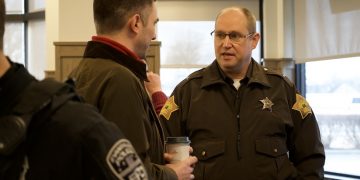Bloomington, Indiana – At Wednesday night’s meeting, Bloomington City Council members expressed their displeasure with the process of approving the proposed $166 million budget for 2021, which was introduced in August during departmental hearings.
The council made a close recommendation to pass the budget in a 4-3-2 vote. Council members Steve Volan, Kate Rosenbarger and Matt Flaherty voted no, while Sue Sgambelluri and Isabel Piedmont-Smith abstained. This vote was not binding and only served to gauge the council’s feelings on legislation at the moment. The final vote on the budget is scheduled for Oct. 14.
City controller Jeff Underwood, who manages the city’s finances, said the formal stage of the budgeting process Bloomington has reached is completely mandated by the state. The council can vote yes, vote no or cut funds.
Some council members criticized the mayor and the executive branch’s collaboration with the council on the budget.
“I think the mayor should no longer assume that vague statements like, ‘We have worked with council’ are sufficient,” Volan said.
Piedmont-Smith said none of the changes to the budget reflected concerns of council members.
“I do not see the administration as being collaborative or forthcoming in this budget process, and I haven’t seen it in any of my many years on the city council,” she said. “I’m tired of it.”
Flaherty said there needs to be a built-in opportunity for public engagement and communication between council members and the executive branch.
“That would allow for some level of compromise and actual discussion of trade-offs, as opposed to this ‘We’ve heard your concerns, did nothing, and here’s the budget. Vote yes or no.’ That’s just not adequate,” he said.
Council member Ron Smith supported the budget, but he said it could have been better with more constituent feedback and more collaboration between the council and administration.
“We all have voiced various dissatisfaction with different parts of the budget, and it seems like the process and the collaborative nature of it just somehow isn’t there,” he said.
Rosenbarger said as a newly elected council member, she expected the council’s input to be better reflected in the budget presented on Wednesday.
“I would say out of the nine of us, we’ve collectively spent hundreds of hours on this,” she said. “And it almost feels like, for what?”
Mayor John Hamilton responded to the criticism and said it was frustrating to hear because he believes his administration has tried to listen to council members’ concerns. He gave examples from past budgets, including a pay scale for temporary workers.
“Nine of you have different ideas of what should be done, and I’m trying to hear those ideas and respect them and come back with different changes tonight,” Hamilton said.
Council members also expressed dissatisfaction about state law that regulates the process of approving city budgets.
The council has little opportunity to make changes to the budget, other than cuts, Piedmont-Smith said.
“We have a hammer to do the job of a scalpel,” she said. “All we can do is just say no, and that’s kind of the nuclear option that nobody wants to take.”
Flaherty said a final yes or no vote doesn’t allow for a sufficient amount of input from the city’s legislative body.
“Mayor Hamilton has said that the city budget is the biggest and most important policy document the city has. I agree,” he said.
The council, the public and city department directors also discussed and sometimes clashed on proposed decisions about the Bloomington Police Department, climate measures and the organization of city departments and positions.
The council discussed the ethics and effectiveness of adding two more police social workers to BPD, a decision that more than 150 people have signed a petition against. Local social worker Donyel Byrd is one of the petition creators and made a public comment at Wednesday night’s meeting. She said social workers don’t belong in police departments, and it would only expand the police force’s reach.
Some council members also expressed concern about the Economic and Sustainable Development Department’s proposed addition of a transportation demand manager. This led to broader debates about the importance of climate action during a pandemic and whether the position would be better suited in the Planning and Transportation Department.




















































































